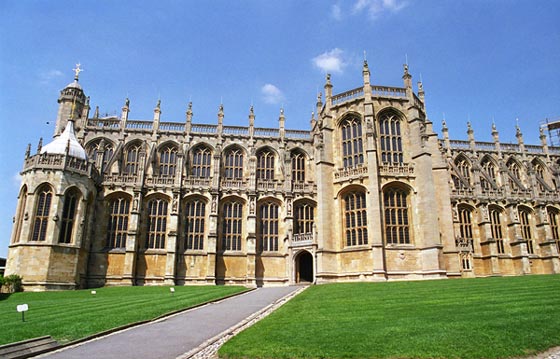當(dāng)前位置: Language Tips> 英語(yǔ)學(xué)習(xí)專(zhuān)欄
分享到
溫莎城堡一直以來(lái)都籠罩著神秘的面紗,她有著近千年的歷史,也一直是英國(guó)君主們的心愛(ài)之所。威廉一世建造城堡之初更多的是為了防御外敵,隨著時(shí)間的推移,幾經(jīng)修繕,她不但成了皇室官邸,也成了一座藝術(shù)寶殿。今年,恰逢伊麗莎白女王二世登基60周年的鉆石慶典,在溫莎城堡之中也有女王登基60年來(lái)的照片展覽。

By Philip Staton
凝墨 選 喬敏 譯
|
Windsor Castle is the oldest and largest occupied castle in the world and the Official Residence of the Queen of Britain. Over a period of nearly 1,000 years it has been inhabited continuously, and altered and refurbished[1] by successive monarchs. Some were great builders, strengthening the Castle against uprising and rebellion; others, living in more peaceful times, created a palatial[2] Royal residence. William the Conqueror chose the site, high above the river Thames and on the edge of a Saxon hunting ground.[3] It was a day’s march from the Tower of London[4] and intended to guard the western approaches to the capital. The outer walls of today’s structure are in the same position as those of the original castle built by William the Conqueror in the 1070s. The Queen uses the Castle both as a private home, where she usually spends the weekend, and as a Royal residence at which she undertakes certain formal duties. Windsor Castle is often used by The Queen to host State Visits from overseas monarchs and presidents. Every year The Queen takes up official residence in Windsor Castle for a month over Easter (March-April). The Castle is huge, so people tend to head for the most spectacular bits—the State Apartments, St. George’s Chapel, the Gallery and the delightful Queen Mary’s Dolls’ House. Works of art, antique furniture, curiosities and impressive architecture reflect the tastes of many different royal generations. The State Apartments are lavishly decorated formal rooms still used for state and official functions. The treasures in the Apartments include works of art by Canaletto, Holbein, Leonardo da Vinci, Rembrandt, Rubens and Van Dyck, as well as the ceilings and woodwork of the rooms themselves.[5] Also on display is a large collection of armor, including an etched gold suit of armor made for prince Hal. The magnificent and beautiful St. George’s Chapel was started in 1475 by Edward IV and was completed fifty years later by Henry VIII. It ranks among the finest examples of late medieval architecture in the UK. Ten monarchs are buried in the Chapel, including Henry VIII with his wife. Many Royal weddings have been celebrated in St. George’s Chapel, including that of Prince Edward and Miss Sophie Rhys-Jones in June 1999. In 2005 a service of dedication and prayer was held in the Chapel following the marriage of The Prince of Wales and The Duchess of Cornwall. The Drawings Gallery features the exhibition “The Queen: Sixty Photographs for Sixty Years” from 4 February to 28 October this year. Sixty photographs of The Queen, including the work of leading press photographers of the past six decades, will go on display to celebrate Her Majesty’s Diamond Jubilee[6]. The exhibition presents a portrait of The Queen as captured in fleeting moments on both official occasions and at relaxed family gatherings. Queen Mary’s Dolls’ House is an amazing dolls’ house built on a scale of 1 to 12. It contains working lifts, running water and electricity, and took 1,500 craftsmen three years to complete. Queen Mary was known as a collector of miniature objects including Fabergé[7] animals, children’s silver furniture and other examples of “tiny craft”. Princess Marie Louise was the King’s cousin. After returning home from a visit to the King and Queen at Windsor Castle, during which they had shown her much kindness, she announced to her family that she would commission a dolls’ house as a present for the Queen. The Changing of the Guard is one of the highlights of a visit to Windsor. A band usually accompanies the Guards, although this is subject to weather conditions. Windsor Castle gives you the good chance to snoop around[8] a royal residence and track the history of the English monarchy. |
溫莎城堡是世界上最古老、面積最大的尚在使用的城堡,也是英國(guó)女王的官邸。在近一千年的歷史中,世襲的君主們一直都居住于此,并對(duì)溫莎城堡不斷進(jìn)行改造和翻新。有些君主進(jìn)行了大刀闊斧的改造,加固城堡以抵御暴動(dòng)和叛亂;而另一些生活在較為和平時(shí)期的君主則創(chuàng)造出了一座宏偉壯麗的皇室宮殿。 威廉一世(征服者)選擇了一處撒克遜人狩獵場(chǎng)的邊緣(來(lái)建造溫莎城堡),高高地位于泰晤士河之上。溫莎城堡距離倫敦塔只有一天的行程,目的是為了守護(hù)倫敦的西大門(mén)。現(xiàn)在溫莎城堡的外墻與11世紀(jì)70年代威廉一世(征服者)建造的原始城堡的外墻位置是一樣的。 女王既將城堡當(dāng)做私人行宮,周末時(shí)來(lái)此度假,也將此處作為自己的皇室官邸,在此履行一些(作為國(guó)家元首的)職責(zé)。溫莎城堡還經(jīng)常被女王用來(lái)接待前來(lái)進(jìn)行國(guó)事訪問(wèn)的外國(guó)君主和總統(tǒng)。女王每年在復(fù)活節(jié)期間(即三四月份)都要來(lái)溫莎城堡住上一個(gè)月,此時(shí)的溫莎城堡成了女王的官方居所。 城堡很大,所以人們都傾向于去參觀最壯觀的地方:國(guó)家外交大廳、圣喬治教堂、畫(huà)廊和令人開(kāi)心的瑪麗皇后的玩偶屋。藝術(shù)品、古家具、奇珍異寶和引人注目的建筑反映了不同皇室家族的品味。 國(guó)家外交大廳由非常莊嚴(yán)的房間組成,裝飾極盡奢華,至今仍是舉行國(guó)家和官方活動(dòng)的場(chǎng)所。大廳里的珍寶包括卡納萊托、霍爾拜因,列奧納多?達(dá)?芬奇、倫勃朗,魯本斯和凡?戴克等人的藝術(shù)作品,房間的天花板和木結(jié)構(gòu)本身也都是藝術(shù)品。大廳里還展示著很多盔甲,這其中還包括為哈爾王子定作的一套蝕刻的金制盔甲。 宏偉而美麗的圣喬治教堂于1475年在愛(ài)德華四世時(shí)開(kāi)工建設(shè),50年后在亨利八世時(shí)竣工。這個(gè)教堂是英國(guó)中世紀(jì)晚期建筑的典范之一。有十位君主被葬在這座教堂里,包括亨利八世和他的妻子。還有很多皇室婚禮都是在圣喬治教堂舉行的,其中包括1999年6月愛(ài)德華王子和蘇菲?里斯-瓊斯小姐的婚禮慶典。2005年,在威爾士王子(查爾斯)和康沃爾郡公爵夫人(卡米拉)結(jié)婚后,圣喬治教堂為他們進(jìn)行了祝福和祈禱的宗教儀式。 畫(huà)廊今年的亮點(diǎn)是展覽“女王:60年來(lái)的60張照片”,這個(gè)展覽將從2月4日持續(xù)到10月28日。60張女王的照片將在此展出以慶祝女王陛下的鉆石慶典,這些照片包括頂級(jí)的攝影師們?cè)谶^(guò)去的60年來(lái)為女王拍攝的照片。該展覽通過(guò)相機(jī)捕捉到女王在正式場(chǎng)合和輕松的家庭聚會(huì)中的短暫瞬間,展示了女王的形象。 瑪麗皇后的玩偶屋是一個(gè)按照1:12的比例建成的令人稱(chēng)奇的玩偶屋。這里有上下運(yùn)行的電梯,水電俱全,當(dāng)時(shí)有1,500名工匠歷時(shí)三年時(shí)間才完工。瑪麗皇后素以收集彼得?法貝熱(制作的)動(dòng)物造型,孩子們的銀質(zhì)家具和其他小手工藝品等微型物件而聞名。瑪麗?路易斯公主是國(guó)王(喬治五世)的表妹。從溫莎城堡拜謁國(guó)王和王后回來(lái)之后,為感激他們?cè)跍厣潜?duì)自己的熱情招待,她向家人宣布要請(qǐng)人建造一座玩偶屋作為禮物獻(xiàn)給王后。 衛(wèi)兵換崗儀式也是溫莎城堡之旅的亮點(diǎn)之一。衛(wèi)兵換崗?fù)ǔS袠?lè)隊(duì)伴奏,但是這也要取決于天氣狀況。溫莎城堡為你提供了一個(gè)窺探皇室官邸和追蹤英國(guó)君主制歷史的絕佳機(jī)會(huì)。 (來(lái)源:英語(yǔ)學(xué)習(xí)雜志 編輯:中國(guó)日?qǐng)?bào)網(wǎng)英語(yǔ)點(diǎn)津 陳丹妮) |
|
Vocabulary: 1. refurbish: 整修,把……翻新。 2. palatial: 富麗堂皇的。 3. William the Conqueror: 威廉一世(征服者),即William I,威廉一世(1028?—1087),原為法國(guó)諾曼底公爵,在黑斯廷斯打敗英王后,自立為王,他引進(jìn)封建主義和諾曼人習(xí)俗,并下令編制土地調(diào)查清冊(cè);Saxon: 撒克遜人,公元五世紀(jì)至六世紀(jì)移民至英國(guó)定居的日耳曼人。 4. Tower of London: 倫敦塔,指英國(guó)倫敦泰晤士河北岸的一組建筑物,原為一古堡,曾先后充作王宮和監(jiān)獄,現(xiàn)已辟為兵器庫(kù)及博物館。 5. Canaletto: 卡納萊托,意大利畫(huà)家,因其關(guān)于威尼斯和倫敦泰晤士河的畫(huà)作而聞名;Holbein: 霍爾拜因,德國(guó)畫(huà)家,歷史上有兩個(gè)霍爾拜因,老霍爾拜因擅長(zhǎng)為宗教作畫(huà),其子小霍爾拜因是著名的德國(guó)畫(huà)家;Leonardo da Vinci: 列奧納多?達(dá)?芬奇,意大利文藝復(fù)興時(shí)期偉大的畫(huà)家、發(fā)明家、科學(xué)家,被公認(rèn)為是有史以來(lái)最偉大的藝術(shù)家和天才之一;Rembrandt: 倫勃朗,荷蘭藝術(shù)家,被認(rèn)為是歐洲最偉大的畫(huà)家之一;Rubens: 魯本斯,佛蘭德斯畫(huà)家,繪畫(huà)以刻畫(huà)高大豐腴的女性而著稱(chēng);Van Dyck: 凡?戴克,佛蘭德斯畫(huà)家。 6. Diamond Jubilee: 60周年紀(jì)念,鉆石紀(jì)念日。今年是英國(guó)女王伊麗莎白二世登基60周年紀(jì)念,故舉辦鉆石慶典。 7. Fabergé: 彼得?法貝熱,俄國(guó)金匠、珠寶商,因他為俄國(guó)皇室家族制作用珠寶裝飾的漂亮復(fù)活節(jié)彩蛋而聞名。 8. snoop around: 窺探,打探。 |
上一篇 : 訓(xùn)練狗狗不容易
下一篇 : 馬里亞納海溝何以成為地球最深處?
分享到
關(guān)注和訂閱


口語(yǔ)
關(guān)于我們 | 聯(lián)系方式 | 招聘信息
電話:8610-84883645
傳真:8610-84883500
Email: languagetips@chinadaily.com.cn